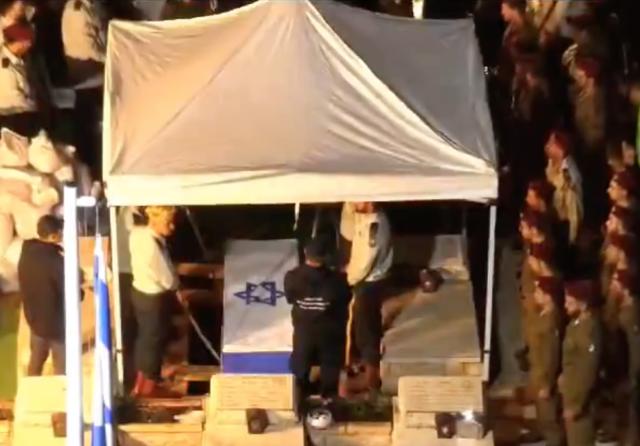In a grave development underscoring the intense challenges facing Israel during its ground operation in Gaza, the nation confronted the tragic loss of 24 soldiers in a single day, marking this as the most severe casualty rate since the onset of military activities. This incident, occurring amidst increasing demands for an end to the hostilities, significantly impacts the Israeli society and its defense forces.
The Israeli Defense Forces reported that a considerable number of these losses, involving 21 reservists, were the result of a devastating rocket-propelled grenade attack. This assault targeted a tank and two structures that were being dismantled by the soldiers, leading to unexpected and substantial fatalities.
I'm at the funeral procession for fallen 22 year old IDF soldier Cpt. Eyal Mevorach Twito
— Documenting Israel (@DocumentIsrael) January 22, 2024
May his memory be for a blessing https://t.co/9LPo1A0to2 pic.twitter.com/hrjm6gqNyZ
In response to this critical situation, Prime Minister Benjamin Netanyahu has undertaken the responsibility of initiating a comprehensive investigation. This decision reflects the seriousness with which the Israeli leadership views the incident, underlining the necessity for the nation to assimilate and act upon the vital lessons stemming from this unfortunate event.
The sorrow of the nation was palpable as it collectively mourned the loss of its soldiers. This was particularly evident during the funeral of reservist Hadar Kapeluk, held at the revered Mount Herzl military cemetery in Jerusalem. More than 200 mourners gathered to pay their respects, highlighting the personal and national grief engulfing Israel.
The increasing casualties among Israeli soldiers, now totaling 221, has prompted significant domestic pressure on the government. The public is increasingly seeking transparent and definitive answers regarding the objectives and justifications of the military operations in Gaza.
IDF unravels Hamas tunnel route in Khan Yunis, rocket plant destroyed.https://t.co/Upk9wlsBFo
— John The Main Guy - Am Yisrael Chai (@JohnTheMainGuy1) January 23, 2024
On the frontlines, the Israeli army has made strategic moves, including the encirclement of Khan Yunis, a crucial city in southern Gaza. However, this military action has been accompanied by concerning reports of an attack on Nasser hospital in Khan Yunis, allegedly by an Israeli tank. The Israeli military has not yet issued a response to these allegations, which are said to have resulted in several casualties.
Further complicating the situation, the Hamas-infiltrted and aligned Palestinian Red Crescent has reported an attack on their headquarters in Khan Yunis, leading to injuries among the displaced individuals seeking shelter there.
Translated from Arabic
— Diana (@Diana2962845618) January 23, 2024
🔴 Red Crescent: Most of the roads leading to the association’s Al-Amal Hospital in Khan Yunis were closed due to continuous gunfire. https://t.co/OyG4NAfJLm
The humanitarian situation in Gaza is deteriorating rapidly, with United Nations agencies and various aid organizations sounding the alarm over the rising threats of disease and famine. It is estimated that around 1.7 million people have been displaced, facing conditions akin to famine, as described by Abeer Etefa from the World Food Programme.
The ongoing conflict, exacerbated by Hamas's attacks initiated on October 7, has caused a significant loss of life. Israeli sources report approximately 1,140 Israeli fatalities, primarily civilians. In Gaza, the death toll is estimated to be around 25,490, predominantly women, children, and adolescents.
The critical issue of hostages remains unresolved, with militants reportedly taking 250 hostages. Israel estimates that approximately 132 hostages, including the bodies of at least 28 deceased individuals, are still held in Gaza.
Amidst these complex dynamics, there is an emerging consensus within the Israeli cabinet regarding the increasing difficulty of Prime Minister Netanyahu's commitment to dismantling Hamas, particularly in the context of recovering the hostages. A recent ceasefire facilitated the release of 105 hostages, including Israelis, in exchange for Palestinian prisoners.
Drone footage from the funeral of Captain Eyal Mevorach Twito, 202nd Paratroopers Battalion, 22 January.
— Ronn Torossian (@RTorossian5wpr) January 23, 2024
Photographer: Chen kalifa levi#idf #Israel
. pic.twitter.com/ZhKj3OhP14
Israel has proposed a new negotiation framework to Hamas, entailing multiple stages and the release of an unspecified number of Palestinian prisoners. This plan aims to incrementally reduce the Israeli military presence in major Gaza cities and enable the return of residents to the northern parts of the territory. However, it notably stops short of promising an end to the war.
The regional implications of these events are becoming increasingly apparent. Hezbollah in Lebanon has claimed responsibility for an attack on Israel's air control base in Meron, citing retaliatory reasons. Concurrently, the United States and Britain have launched airstrikes against Yemen's Houthi rebels in response to their attacks on Red Sea shipping, which the Houthis justify as solidarity with the Palestinians in Gaza.
This multifaceted and rapidly evolving situation, with its intersecting interests and actors, highlights the profound and far-reaching implications of the conflict, not only for Israel and Gaza but for the broader Middle East region.


